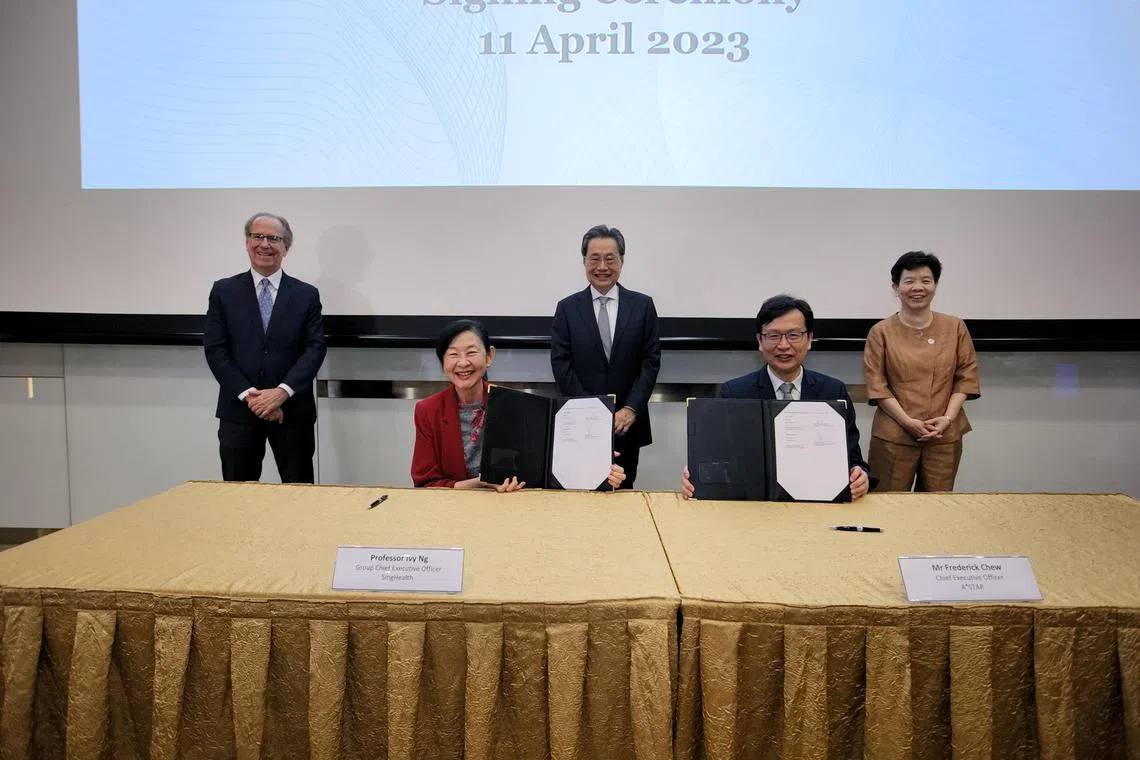SingHealth, A*Star to collaborate, fund innovative projects to advance medical technology
Sign up now: Get ST's newsletters delivered to your inbox

(From left) Duke-NUS Medical School dean Thomas Coffman, SingHealth group CEO Ivy Ng, SingHealth chairman Cheng Wai Keung, A*Star CEO Frederick Chew and A*Star chairman Chan Lai Fung at the signing of a new partnership between SingHealth and A*Star on April 11, 2023.
PHOTO: SINGHEALTH
SINGAPORE – An imaging system which could improve the diagnosis of eye diseases and make procedures such as Lasik more effective is being studied by scientists here.
The terahertz (THz) imaging system, typically used for purposes such as security screening, is found to be safe for use on eye tissue, and is expected to make refractive surgery more efficient by allowing for real-time monitoring of the level of hydration in the corneas.
THz waves have frequencies between infrared light and microwaves, and can penetrate materials without damaging them.
The team, comprising clinicians and researchers from SingHealth’s Singapore National Eye Centre (SNEC) and the Singapore Eye Research Institute (Seri), as well as the Institute of Materials Research and Engineering under the Agency for Science, Technology and Research (A*Star), is studying the usefulness of the new system in the evaluation of ocular surface diseases such as corneal opacity and dry eye disease.
In collaboration with industry partners, they are developing a clinical tool called Terahertz High-Definition Eye Analysis (Thea).
Thea is also expected to prove useful in community health institutions, helping to identify ocular diseases earlier, said Associate Professor Liu Yu-Chi, the clinical principal investigator of the project, on Tuesday.
The team intends to begin clinical trials soon. Thea is expected to become commercially available in about five years, added Prof Liu, a clinician scientist at SNEC’s corneal and external eye disease department.
Thea is the first project under a new partnership between SingHealth and A*Star which was inked on Tuesday at an event held at the National Heart Centre Singapore.
The partnership will provide $8 million – with both parties contributing equally – in funding for projects in areas such as medical technology, data science and artificial intelligence.
It will also establish a framework and consolidate resources to facilitate joint projects between the SingHealth Duke-NUS Academic Medical Centre and A*Star.
The collaboration between the two centres will develop medical solutions which can benefit patients and better support healthcare workers, said A*Star chief executive Frederick Chew.
The partnership will initially support three to five projects, with each project receiving funding of between $500,000 and $2 million, depending on the size and complexity of the work involved, said Associate Professor Yeo Khung Keong, deputy group chief medical informatics officer of research at SingHealth.
“We don’t expect this funding to be the be-all, end-all. We will definitely need these innovations to continue to find additional support,” he added.
Seven other projects have been shortlisted, he added.
SingHealth and A*Star had previously partnered to establish a joint lab by Seri and the Institute of High Performance Computing that focuses on researching the adoption of artificial intelligence and digital technologies in eye care.


